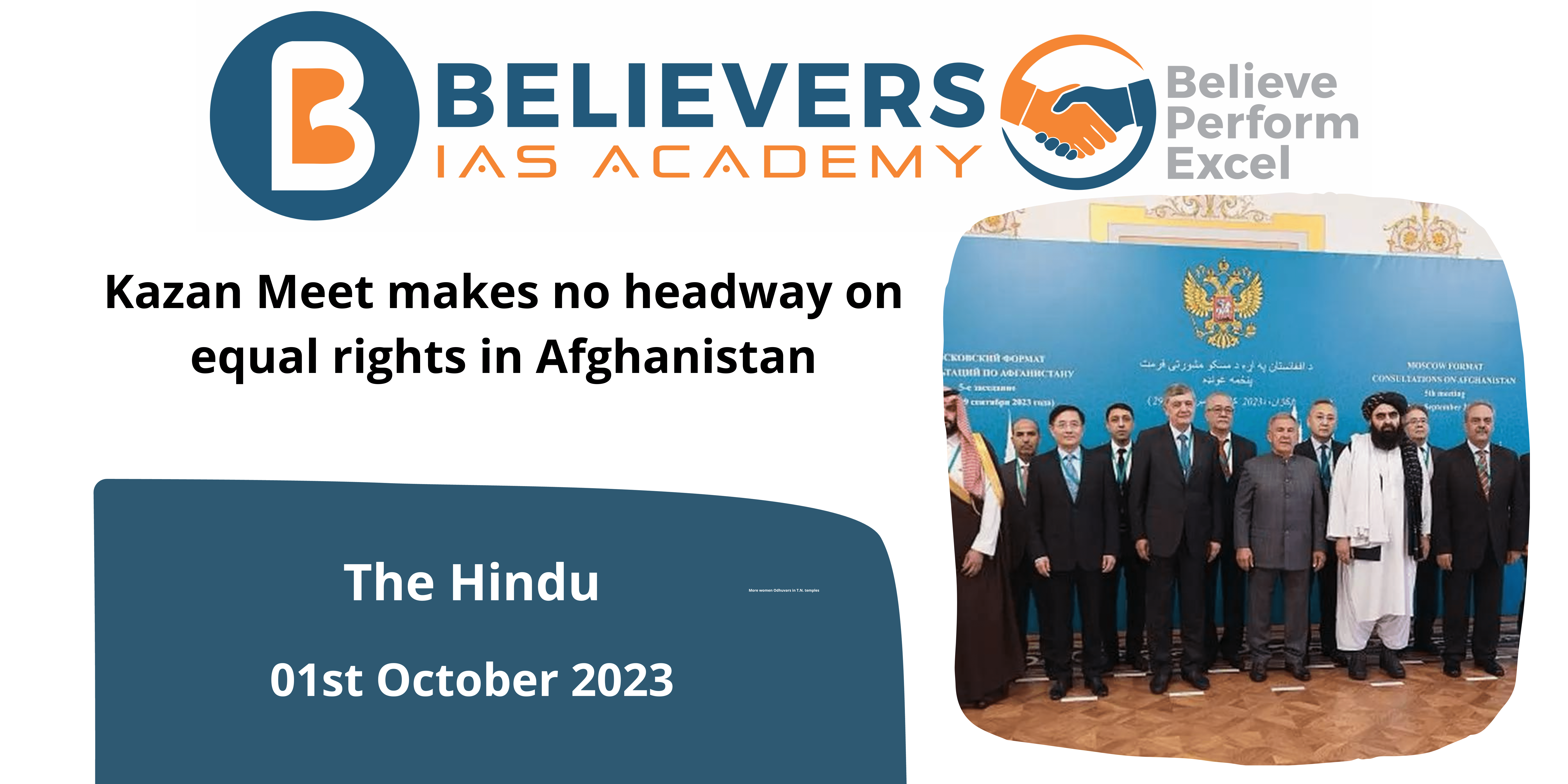Kazan Meet makes no headway on equal rights in Afghanistan
Context
India participated in the nine-nation “Moscow Format” meeting on Saturday in the Russian city of Kazan even though it was unclear whether the Afghanistan Embassy in Delhi would close within the upcoming week. The gathering also invited the acting foreign minister of the Taliban. The gathering also included special representatives from Pakistan, Russia, China, Iran, and Central Asian nations.
What is the background on the Social situation in Afghanistan after the USA exited the country?
Afghanistan experienced a humanitarian crisis, a ruined economy, and a Taliban rule that was substantially identical from 1996–2001 after the United States withdrew its forces in August 2021.
Some of the conditions that Afghanistan Nationals faced during the Taliban Regime are as follows:
- A crumbling economy
- Humanitarian emergency
- a Taliban government that has remained largely unaltered since 1996
- No money to pay bills or purchase food
- Western funding has been halted since the Taliban government contains terrorist organizations
- Acute hunger and famine are imminent dangers for millions of Afghans.
- rapid deterioration in the economy
- Malnutrition and the risk of hunger
- global commodity shocks are causing inflation.
- A sharp increase in both urban and rural poverty
- A near-collapse of the national public health system
- Nearly absolute exclusion of women, who make up half the population
What is the Moscow Format Meeting?
The Moscow Format Meeting, also referred to as the “Moscow Format on Afghanistan,” is a diplomatic initiative designed to promote communication and cooperation between different nations and players interested in resolving the Afghan crisis. As part of its initiatives to encourage a peaceful conclusion to the violence and instability in Afghanistan, the Russian government initially started it in 2017.
What are the features of the Moscow Format Meeting?
- Multilateral diplomacy: A wide range of nations and international organizations with an interest in Afghanistan come together at the Moscow Format Meeting. It consists of nearby nations, regional powers, and international players.
- Inclusive Approach: The project encourages inclusivity by bringing together representatives from various Afghan political factions and organisations for conversations with foreign diplomats. With this strategy, we hope to promote a variety of Afghan voices to participate in the peace process.
- Conflict Resolution: The Moscow Format Meeting’s main goal is to encourage dialogue and negotiations between Afghan parties and regional and international stakeholders in order to find a peaceful solution to the conflict in Afghanistan.
- Security and stability: The meeting frequently touches on issues related to Afghanistan’s security and stability, such as counterterrorism initiatives and the part played by various factions in the nation’s security environment.
- Humanitarian Concerns: During these discussions, humanitarian concerns are also covered, including the protection of civilians, access to relief, and the avoidance of a humanitarian crisis.
- Taliban recognition: The Moscow Format offers a forum for engagement and discussion with Taliban officials as one of the main factions in Afghanistan, despite the fact that it does not formally recognize the Taliban as a legitimate government.
What is the Kazan Declaration and what are the areas discussed in the declaration?
The Kazan Declaration is a document that resulted from the fifth regional consultation on Afghanistan, known as the “Moscow Format,” which took place in Kazan, Russia. This declaration outlines the key areas of discussion and agreements reached during the meeting.
- Inclusive Government in Afghanistan: The Kazan Declaration stressed the need for Afghanistan to have an inclusive government. It emphasized how crucial it was for all ethnic and political groupings to take part in governing the nation.
- Ethno-Political Representation: The proclamation made it clear that political pluralism is not achieved by appointing individual members from Afghanistan’s numerous ethnic groups to the Kabul government. It demanded a more thorough and impartial portrayal of various communities.
- Dialogue with Ethno-Political organizations: The Afghan interim government has been asked to start an effective conversation with members of ethnic political organizations. The objective is to conclude the peaceful settlement process and provide a fair, larger, more thorough, accommodating, and responsible accord.
- Counterterrorism: Due to the actions of terrorist organizations, notably ISIS, the proclamation highlighted worries about the security situation in Afghanistan. It emphasized the Taliban’s commitment to fighting terrorism and urged Kabul to adopt practical measures to stop terrorist organizations from forming there.
- Preventing Refugee Inflow: At the Kazan meeting, it was discussed that Afghanistan’s living circumstances must be improved in order to stop the flow of refugees into the surrounding nations. It stressed how crucial it was for the Afghan government to foster the wellbeing of the Afghan people and protect their fundamental rights and freedoms.
- Women’s Rights and Education:Concerns over the current limitations on women’s employment and girls’ education in Afghanistan have been expressed. It was requested of the interim administration to establish education at schools in line with international standards.
Conclusion
The Kazan Declaration summarizes the discussions and agreements made at the Kazan, Russia, meeting of the Moscow Format, with a focus on establishing an inclusive government in Afghanistan, addressing security and humanitarian issues, and fostering economic cooperation and regional stability.




